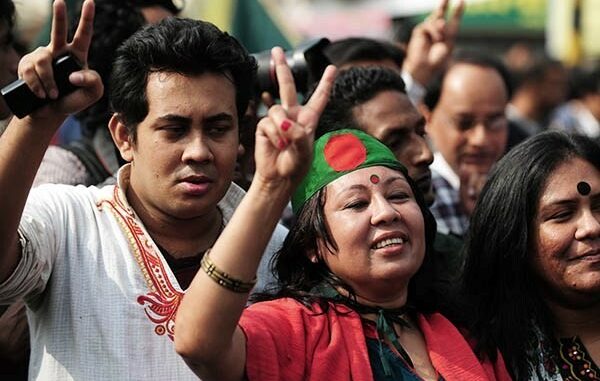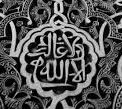
Z and I, are best friends. we are sisters from two mothers; we are also heirs to a tragic past. She is from Bangladesh and I from Pakistan. Before 1971, it was one Country— East and West Pakistan.
“Bengali and Paskistani-American get along famously because of shared history and proximity”, “they are one people” as goes the popular assumption. That’s a myth. Islamists played a major role poisoning that relationship, and they still do today in America.
Ramadan Friends
We had been living in the same building, unaware of the existence of one another, until I ran into her helper in the elevator. It was the month of Ramadan. I was carrying a heavy load of grocery bags, filled with exotic ingredients to prepare special food for Iftaar, recipes rarely made during the year. Z’s helper, Joy, offered to help me carry some of the bags. I sheepishly told her that this is in preparation for the month of fasting for Muslims.
Joy, it turned out, was a Catholic originally from Philippines. I had assumed she wouldn’t know much about the Muslim holidays. I wasn’t expecting to hear that not only did she know about Ramadan, but her employers were a Muslim family. I was overjoyed to hear that there is another Muslim family in the building. I immediately asked her to connect me with them.
Ramadan brought Z and I together. That month, we started to send each other our ethnic cuisines for Iftaar.
Bengalis & Pakistanis: Past Roots, Present Humiliations
Although Z was from Bangladesh, she could converse in Urdu/Hindi. Her maternal grandmother, like mine, had moved to Pakistan from India. my grandmother came as a refugee at the time of the partition of India. Z’s grandmother moved much later. Z’s mother was already married to a Bengali by that time and lived in Bangladesh. Z visited her grandmother in Pakistan every year. She did this while enduring the humiliation that Bengalis have to suffer at the hands of Pakistani immigration service. Also, the ordeal of obtaining the visa. Then there is the indignity of the terrible condition to report to a Police station every week while in Pakistan. Regardless of all this, Z still loved visiting her grandmother, she enjoyed eating Chaat and Chicken biryanni at Clifton.
Bengali Identity Comes Out
Despite her yearly visits to Pakistan and having studied in India, Z was raised with a very strong Bengali identity. It is an identity rooted in Bengali culture, language and tradition. Religion for them was just a small component of a plural, multi-layered identities.
She didn’t learn to read Koran in Arabic clearly, it was a clue for me to think that she was not raised religious.
“You would think that even profanity in Arabic is holy”
I learnt that this was not very uncommon in Bangladesh, Bengali’s unlike Pakistani’s read the translation of Koran in their own language. In Pakistan, Koran classes are compulsory for children in schools in the Arabic language.
The irony was Z knew what she was reading while I didn’t, I only learnt to read Arabic, for us reciting Koran in Arabic was a virtue. understanding it was not emphasized. “You would think that even profanity in Arabic is holy, since you would not even know what it means” she would joke with me
Islamist Mosque Revives Dark Past
I visited the Mosque frequently, for Jumma, and would make a special effort during Ramadan, to go every night for Taraweeh, the special night’s prayers. I invited Z to come with me to the Mosque. I could tell she did not feel very comfortable going, but still would accompany me to make me happy. I could sense that she felt alienated in a Mosque dominated and run by Pakistanis and heavily influenced by Jamaat-e-Islami.
As a Bengalis, the combination of Pakistan and Jamaat-e-Islami was a dark reminder of an atrocious past and present danger.
Painful Bengali History
It was Pakistan who imposed ‘Urdu’ on them to root out their language .We snatched the hard earned dollars from Bengalis, and deprived them of development and squandered the precious money in West Pakistan – as Bangladesh was known back then.
Bengalis Abused By Pakistani Rule
When Bangladesh (East Pakistan) suffered under the greatest natural disaster of the 20th century, Cyclone Bhola. It killed half a Million people in 1970. Pakistan did nothing to help.
Later that same year, when the Bengalis won the 1970 elections,, we refused to transfer power in our desire to stay in charge of the country without letting the Bengalis come to power because they were ‘dark-skinned’ ‘Hindu agents’ according to the widespread hateful stereotypes in today’s Pakistan. When Bengalis protested, we launched ‘Operation Searchlight. In this operation we killed nearly three million Bengalis, and raped nearly 300,000 females.
Islamist Treachery
The Jamaat openly advocates “Islamic revolution”, and calls for the establishment of a worldwide Islamic caliphate. Before the war, it was attempting then to use religion as an instrument to redefine Bengali national identity.
The Jamaat, at the time of Bangladesh’s liberation war in 1971, fought to maintain the country as a province of Pakistan. It did so because it shared a Muslim identity with “West” Pakistan. However, most Bengalis back then wanted a secular society rooted in Bengali culture rather than in political Islam.
US Islamists’ Umma: A Hurtful Pipe Dream
Seeing how miserable Z would be in the Mosque, I stopped asking her to come.
in fact, for a while, I stopped going myself. I knew Z was not cut for a version of Islam preached from the pulpit of our Islamist Mosque.
Jamaat-e-islami, like most Islamists, want individuals to erase their cultural identities by linking them into the global “culture-free” identity of the Umma.
She is a proud Bengali and was not willing to compromise on her national identity. Bangladesh was not East Pakistan. We are separate people, Pakistanis and Bengalis.
